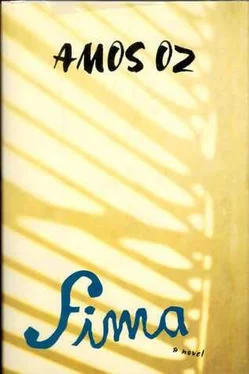Once, when Dimi was eight, Ted and Yael had called him in a panic at ten in the morning to ask him to help search for the child, who apparently ran away from school because the other children had been bullying him. Without a moment's hesitation Fima called a taxi and hurried to the cosmetics factory in Romema. And indeed he found Baruch and Dimi shut up together in the small laboratory, bent over a bench, silvery mane touching albino curls; they were distilling a bluish liquid in a test tube over a burner. As he entered, the old man and the child both fell silent, like conspirators caught in the act. In those days Dimi was still in the habit of calling both Baruch and Fima "Granpa." The father, with his Trotsky beard curving upward like a Saracen scimitar, refused to reveal to Fima the nature of their experiment: there was no way of knowing whose side he was on. But Dimi, serious and secretive, said he trusted Fima not to give them away. Granpa and me arc developing an antistupidity spray. Wherever stupidity shows up, you can pull out a little canister, give a squirt, and it's gone. Fima said: You'll have to manufacture at least a hundred thousand tons of it in the first batch. Baruch said: Maybe we're wasting our time, Diminka. Clever people don't need the treatment, and as for fools, tell me, my dears, why should we weary ourselves for fools? Why don't we have some fun instead? At once he rang for a tray of candy, nuts, and fruit. With a sigh he took a bundle of little sticks out of a drawer and told the child to lock the door; the three of them spent the rest of the morning absorbed in a spillikins contest. The memory of that illicit morning's fun shone in Fima's mind as a patch of happiness such as he had never known even in his own childhood. Then, at midday, he had had to stir himself and return Dimi to his parents. Ted sentenced the child to two hours' solitary confinement in the bathroom and a further two days of house arrest. Fima also received a reprimand. He was almost sorry they had abandoned work on the antistupidity spray.
In the bus on the way to work he thought over what Mrs. Schoenberg had said about the doleful informer, and said to himself: To be forgotten by God is not necessarily to be doomed. On the contrary, it may mean becoming as light and free as a lizard in the desert. He brooded on the similarity between two Hebrew verbs, the one meaning "forget" and the other "dwindle" or "die away." The most wretched fate was not to be forgotten but, precisely, to fade away. Will, longings, memories, carnal desires, curiosity, passion, gladness, generosity — everything gradually faded. As the wind died in the mountains, so the spirit too expired. Indeed, even pain decreased somewhat with the passage of the years, but then, together with pain, other signs of life also declined. The simple, silent, primal things, those things that every child greeted with excitement and wonderment, such as die succession of the seasons, a kitten scampering in the yard, a door swiveling on its hinges, the life cycle of plants, swelling fruit, whispering pines, a column of ants on the veranda, the play of light on the valleys and the hillsides, the pallor of the moon and its halo, spiders' webs laden with dewdrops in the early morning, the miracles of breathing, speech, twilight, water boiling and water freezing, the glitter of the midday sun on a any sliver of glass, so many primal things that we once had but have lost. Things never to return. Or, worse, they will return rarely, glimmering in the distance, while the original excitement will have vanished forever. And everything is dimmed and dissolved. Life itself is gradually growing dusty and grubby. Who will win in France? What will the Likud central committee decide? Why was the article rejected? How much docs a managing director earn? How will the minister respond to the charges that have been leveled at him?
This morning I was told, and said myself: "I'm late, I must run." But why? Run where? For what? Surely even Minister Rabin must have been excited by those primal things once, as he stood a thousand years ago, a withdrawn, ginger-haired child, a thin, freckled child with no shoes on, in a back yard in Tel Aviv, among the clotheslines, at six o'clock on an autumn morning, when suddenly a flock of cranes flew past overhead, white against the dawn clouds, promising him, like me, a pure world, hill of silence and blueness, far from words and lies, if only we dare leave everything behind and get up and go. But here we are, this minister of defense just like the rest of us who attack him daily in the newspapers, we've all forgotten and we've all faded. We are all dead souls. Everywhere we go, we leave behind us a trail of lifeless words, from which it is only a short way to the corpses of Arab children killed daily in the Territories. A short way to the fact that a man like me erases from the register of the dead, without thinking, the children of the family of settlers burned alive the day before yesterday by a Molotov cocktail on the road to Alfei Menashe. How could I have forgotten? Was their death insufficiendy innocent? Unworthy to enter the shrine of suffering of which we have, as it were, made ourselves the guardians? Is it just that the settlers frighten and infuriate me, whereas the Arab children weigh on my conscience? Can a worthless man like me have sunk so low as to make a distinction between the intolerable killing of children and the not-so-intolerable killing of children? Justice itself sounded forth from the mouth of Mrs. Schoenberg when she said to me simply: "Pity is pity." Minister of Defense Rabin is betraying our basic values ct cetera, whereas in Rabin's view I and my ilk are betraying the fundamental principles et cetera. But in relation to the distant call of the primal splendor of an autumn morning, in relation to that flight of cranes, surely we are all traitors. No difference between the minister and me. We have even poisoned Dimi and his friends. Therefore I ought to write a few lines to Rabin, to apologize, to try to explain that we are in the same boat after all. Or perhaps to ask for a meeting?
"That's enough." Fima smiled wryly. "We have sinned. We have transgressed. That's enough."
When he got off the bus, he muttered like a captious old man: "Wordplay. Empty wordplay." Because suddenly his earlier juggling with the words for "forget" and "dwindle" or "die away" struck him as so cheap that he did not even say thank you or good-bye to the driver as he got off the bus, which he was always very particular about doing, even in moments of absent-mindedness, including yesterday when he inadvertently got off at the wrong stop.
Fima stood in the gray street for a moment or two, among dead leaves and scraps of paper blowing in the wind. He concentrated on the whisper of damp pines behind the stone walls, and he stared at the departing bus. What had he left on the bus? A book? An umbrella? An envelope? Perhaps a small package? Something belonging to Tamar? Or to Annette Tadmor? "Cranes wheel and whirl": a forgotten line from an old children's song suddenly came back to him. He consoled himself with the hope that what he had forgotten on the seat was merely the copy of Ma'ariv that he found there. Thanks to the minister and the cranes, he could not even remember the headlines.
IN THE GARDEN, AS HE WALKED ALONG THE PAVED PATH THAT LED around the small block of flats to the clinic, he stopped and stood for a moment, because from the second floor, through closed windows, wind, and rustling pine trees, there came the sound of a cello. One of the old women, or perhaps a pupil, was practicing the same scales over and over again.
Fima tried vainly to identify the tune, standing and listening like a man who does not know where he has come from or where he must go. If only he could change his material state at this instant, and become air, or stone, or a crane. A cello was being plucked inside him, answering the cello overhead in its own language, a sound of yearning and self-mockery. He had a mental image of the lives of those three elderly women musicians, who ratded along rain-swept winter roads for hours in a taxi to give a recital in some remote kibbutz at the far end of Upper Galilee or at the opening ceremony of a war veterans' reunion. How did they spend their free evenings in the winter? After washing the dishes and clearing up the kitchen, they probably gathered, the three of them, in their communal room. Fima conjured up the image of a severely puritanical room containing a pendulum clock with the hours marked in Roman characters, a sideboard, a heavy, thick-legged round dining table, and dark straight-backed chairs. A gray woollen poodle crouched on the carpet in a corner of the room. On the closed grand piano, on the table, and on the chest of drawers were spread lace mats, like those that covered every available surface in his father's flat in Rehavia. There was also a heavy, old-fashioned radio set, and blue dried flowers in a tall vase. The curtains were drawn, the shutters closed tight, and a blue flame glowed in the heater, which bubbled faintly from time to time as the kerosene flowed from the reservoir to the wick. One of the women, perhaps each in turn, read softly to the others from an old German novel. Lotte in Weimar , for example. There was no sound the whole evening apart from the reader's voice and the ticking of the clock and the bubbling of the heater. At eleven o'clock precisely they got up and went to their respective bedrooms. Their three doors closed behind them until the morning. And in the main room, in the deep silence and the darkness, the clock kept ticking relentlessly, and chiming softly every hour.
Читать дальше












